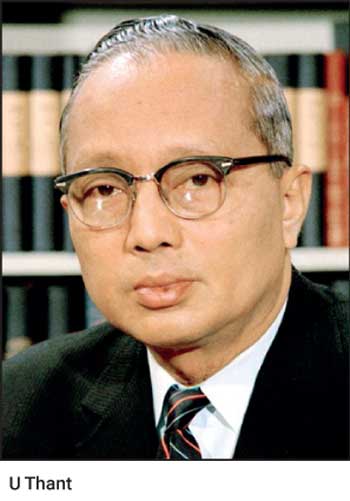Friday Feb 20, 2026
Friday Feb 20, 2026
Saturday, 8 June 2024 00:00 - - {{hitsCtrl.values.hits}}
 By Don de Silva
By Don de Silva
How do you impact the world through Buddhist practice?
In the annals of human history, some individuals leave a clear footprint on the sprawling canvas of human civilisation through their words and actions.
One such person was U Thant, the third Secretary-General of the United Nations (1961-1971), hailing from the small town of Pantanaw, Burma. U is an honorific name. Despite his invaluable contribution to commence international environmental action, there is hardly any reference to him in environmental discussions. He was a staunch Buddhist practicing his art of calmness amidst chaos, an essential quality, invaluable for the task he had at hand.
According to an article written about him in the New York Times: “Each morning, after rising at 6:30, U Thant of Burma, Secretary General of the United Nations, performs a Buddhist rite. He sits, quite alone, and meditates. In those minutes, perhaps 5 or 10, Thant makes no offering to Buddha, nor does he kneel in prayer. Instead, he quietly, yet actively, strives to attain what he calls, humbly, ‘emotional equilibrium’.”
“This is a sort of mental quiet,” he told New York Times. “It is a certain feeling of detachment, which is a necessity of Buddhism — to separate oneself from the conflicts outside. The emotional equilibrium, if one can call it that, implies emotional calmness. In a way, it is an exercise in suppressing evil thoughts and evil attitudes—anger, bitterness, malice, hatred—which are all evil states of mind, according to Buddhism.”
But it was Thant’s contribution to the field of environmental consciousness that partly marks his legacy in a backdrop where books like Rachel Carson’s “The Silent Spring” pricked the world’s conscience.
Responding to these worldwide concerns, he called for a report: UN’s first-ever document on the global environment – “Problems of the Human Environment”, produced in 1969. It is tough and hard-hitting.
It was this report, which encouraged world governments to adopt the historic UN resolution on 3 December 1968, which stated in part:
“Convinced that increased attention to the problem of the human environment is essential for sound economic and social development.”
The third UN Secretary General’s plea was simple - the Earth will face severe environmental challenges, and the time to act was now. His clarion call for attention resulted in the first-ever global Earth Summit in June 1972. This significant gathering led to the birth of the United Nations Environment Programme (UNEP), a milestone in global environmental policy making and action. This is where I worked for many years. Meanwhile, in the overall milieu of negativity concerning our environment, a few among the many positive results from UNEP’s activities are worth mentioning. They are; the concept of sustainability; action to combat climate change; and the creation of the UNFCCC Secretariat (UN Climate Change) tasked with global response to climate change; and the annual climate change meetings.
What immediate action now?
Everything is not gloom and doom. Global investment in green energy hit a record $ 1.8 trillion in 2023, marking a 17% increase from the previous year (BloombergNEF). Electrified transport saw the most significant growth, with a 36% increase in investment, totalling $ 634 billion in 2023.
Renewable energy investment grew by 8% to $623 billion (Power Technology). China led the global investments with $ 676 billion in 2023, accounting for 38% of the total. The combined investments of the EU, US, and UK was more than that of China, indicating strong commitment from these regions (BloombergNEF). In 2022, the United States saw renewable energy sources surpass coal in the electric power sector for the first time. This significant milestone underscores the growing shift towards cleaner energy sources. According to the United States Energy Information Administration (EIA), renewables provided 22% of the electricity generation of the United States, overtaking coal which contributed 20%.
Small nations like Bhutan, Surinam, Costa Rica and the Dominican Republic are showing the way towards significant emission reductions and economic sustainability. South Africa has ambitious targets to achieve carbon neutrality by mid century.
Bhutan absorbs more carbon dioxide than it emits due to its extensive forest cover, which acts as a carbon sink. Bhutan’s commitment to environmental preservation is enshrined in its constitution, which mandates that at least 60% of the country’s land must remain forested. (World Resources Institute) (RAND) (Inter-American Development Bank).
While these activities are not sufficient to meet global climate targets, they do represent significant progress and a positive trend.
Returning to U Thant. When his second term as UN Secretary General was ending, governments urged him to continue, but he refused and bowed out gracefully. Retirement did not diminish his passion. His days remained filled with service and meditation until lung cancer claimed him in 1974. He was 65 years old. In U Thant’s legacy, we find a model of leadership that marries serenity with strength, humility with resolve, and in his words and deeds, an unwavering commitment to effective action. His life, much like his morning meditation ritual, was a journey towards equilibrium, a balance between action and reflection, and environmental consciousness.
(The writer is a former director of the United Nations Environment Programme (UNEP) who links traditional knowledge, environmental sciences and spiritual/cultural heritage. Don de Silva is a Buddhist Counsellor and Mentor at several UK universities. He is also involved with Sri Lankan universities. He researches Buddhism based values and its relevance to sustainability, peace, unity, abundance and communication systems).